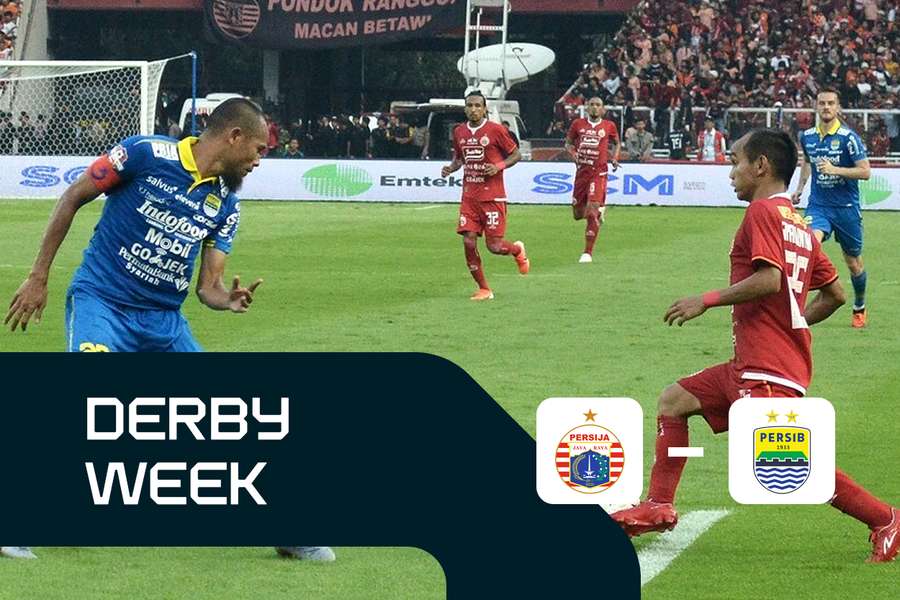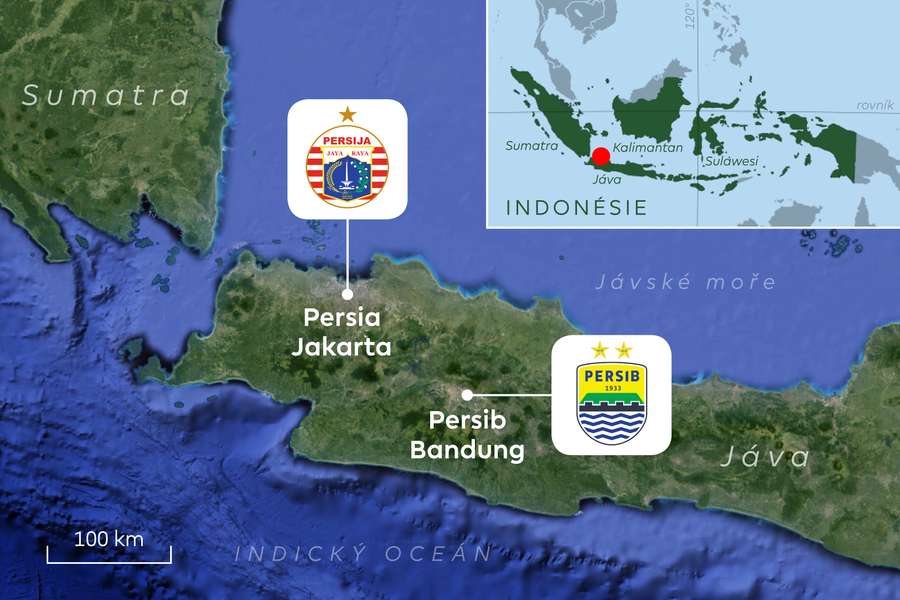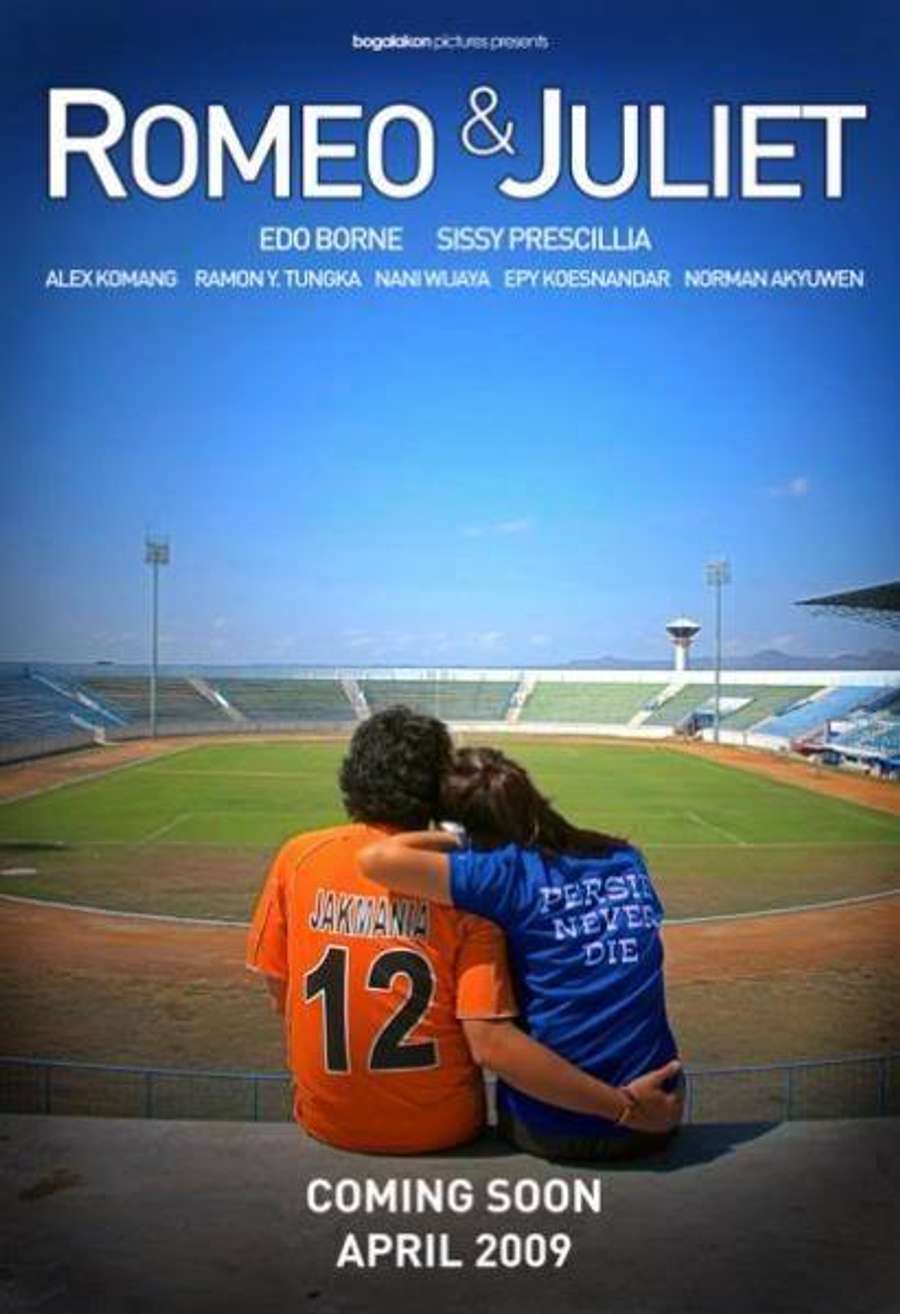Derby Week: Indonesia prepares for battle on and off the pitch

Huge country, huge cities, huge emotions
Indonesia is spread over more than 17,000 islands. With nearly 280 million inhabitants, it is the fourth most populous country in the world. The 300 indigenous ethnic groups speak about 750 languages and dialects. Indonesians also follow many different religions, however, Islam dominates - thanks to its huge population. Indonesia is the largest Muslim country in the world.
Other outside cultures, including colonisers, have also influenced Indonesian history and culture. In 1602, the Dutch East India Company was formed and became the dominant force in the region. In 1800, the Dutch declared the territory of present-day Indonesia as their colony - they called it the Dutch East Indies. Indonesia did not gain independence until after World War II.
The main Indonesian city is Jakarta, which in the course of its dynamic growth has absorbed other large settlements in the vicinity, creating the giant agglomeration of Jabodetabek (an acronym of the names of the cities of Jakarta, Bogor, Depok, Tangerang, Bekasi). Jabodetabek is considered the second largest city area in the world after the Tokyo-Yokohama area in Japan. It has over 30 million inhabitants.
Not far from the Jakarta metropolitan area, within the western part of the island of Java, about 150 kilometres to the south-east (although in such a highly urbanised area it is difficult to determine where the city begins and ends), lies another large city, also a metropolis of several million people - Bandung.
At the beginning of the 20th century, the ruling Dutch were considering moving the capital from Jakarta to Bandung, which is inland, surrounded by mountains, and therefore better protected. However, this plan was ultimately not carried out.
However, there has historically been a great rivalry between the cities. This is reinforced by the differences in the ethnic composition of the two places. In Jakarta, although the population is very diverse given its huge size, the Javanese are the most represented.
The population of Bandung, on the other hand, is largely made up of ethnic Sundanese. The Javanese and Sundanese are the largest ethnic groups in Indonesia, and thus have the greatest disputes between them.
It is often said that the reflection of a country or city's society is its football and football culture. In Indonesia, this is clearly true. Football plays a significant role in Indonesian culture. Fans experience football incredibly, they love it. They are passionate and very vocal. The atmosphere in the stadiums is intense, full of colour - banners and pyrotechnics - and sound. Through football, Indonesians vent all their emotions, both positive and, unfortunately, negative.

Jakarta v Bandung - Persija v Persib
Both cities are home to two strong and successful clubs. Jakarta is home to Persija, while Bandung is home to Persib. Both clubs are traditional, having been founded in the "Dutch" part of the country's history in the 1920s.
The names Persija and Persib are acronyms of the full names of the clubs - Persatuan Sepakbola Indonesia Jakarta and Persatuan Sepakbola Indonesia Bandung (literally Indonesian Football Association Jakarta/Bangung).
Both clubs are multiple champions of Indonesia - Persija has won 11 titles, Persib 7. In the last season 2022/2023, Persija finished 2nd, while Persib was 3rd. The rivalry between Persija Jakarta and Persib Bandung is referred to as 'Duel Klasik'.
Duel Klasik divides all
But the animosity between the two teams' fans doesn't just stem from the competitive relationship between the two cities and their clubs. Persija supporters from the capital consider themselves "better people" representing the upper social class. Bandung residents, on the other hand, are largely composed of migrants from different, less-developed parts of Indonesia.
Many people from Bandung also migrate to Jakarta for work. Persib thus has many supporters in Jakarta as well, mostly from the migrant and lower classes. Fans of Persjs make fun of Persib supporters with hostile chants and songs in which they chant: "You are just small businessmen trying to make a name for yourselves in our beautiful, better city."
When the rivalry gets too much to bear
The animosity between the two groups of fans often results in violent clashes. Unfortunately, many clashes have not been without loss of life. For many years, Duel Klasik has been banned for away fans.
Players of the visiting team must normally be transported to the stadium in armoured personnel carriers. The stadiums of both clubs are traditionally sold out for derbies (Persija's stadium has a capacity of over 77,000 spectators, while Persibu's stadium can accommodate 38,000). Even without the presence of the visiting team's fans, serious incidents have occurred time and time again in connection with derbies and beyond.
One such incident was when a bus carrying Persija fans was ambushed while on its way to a match against their opponent, but they had to travel via Bandung.
Radical Persib supporters sniffed out the bus with the hated rivals, ambushed it and a brawl ensued right on the highway. A particularly brutal incident was the murder of 23-year-old Persija fan Haringg Sirl, who was travelling incognito to a match in Bandung in 2018. He was beaten to death after being discovered by local ultras.
In October, it will be exactly one year since a huge tragedy that took place during another major Indonesian derby match. In a match between East Java rivals Arema Malang and Persebaya Surubaya, the home fans could not bear to see their team lose and some 3,000 of them stormed the field of play and attacked players and officials of the visiting Persebaya.
Police decided to pacify the frenzied crowd using tear gas. However, this led to even more confusion and a stampede in which 135 people were trampled and suffocated and over 500 were injured (some sources put the number of casualties and injuries even higher).
Romeo and Juliet
The rivalry between Persija Jakarta and Persib Bandung, and especially between their fans, is the main theme of the 2009 Indonesian film Romeo and Juliet. Those who want to avoid spoilers should skip to the next and final chapter.
As the title suggests, this is a romantic story where a die-hard Persija fan, Rangga, falls in love with a Persiba fan named Desi. Rangga is willing to risk his life to find his love in hostile Bandung. After their meeting, Desi tries in vain to convince his family to accept Rangga and their relationship. The loving couple must flee to another, distant city that has nothing to do with Persija and Persib.

Derby and football culture
Duel Klasik is considered one of the most fierce derbies in all of Asia. With its impact on the society of the Indonesian cities of Jakarta and Bandung, it can even be said to be a derby of global significance. But unfortunately, mostly from a negative point of view. Football in Indonesia is on the rise though.
There are a number of foreign players in the local leagues, led by many Brazilians. Let us hope and trust that the football culture there will not be too late in its development and that Indonesian football derbies will be known for the wonderful atmosphere in sold-out stadiums and perhaps even for good football, rather than filling the pages of the newspapers with reports of more violence and disasters.
Other derbies of the week
Friday, September 1st
Ireland - Premier Division
Dublin derby
The Dublin derby between Shamrock Rovers and Bohemians is the biggest derby in Irish football. As well as being based in the capital, both clubs are among the most successful teams in history. Shamrock Rovers top the historical tables in terms of titles. Rovers have been Irish champions 20 times.
This year, in the 2023 season (played on a spring-autumn system), Shamrock is aiming for a fourth consecutive triumph. Bohemians has won the Irish title 11 times with the last one coming in 2009. Currently, Bohemians are currently fourth in the table, seven points behind leaders Shamrock Rovers with eight rounds left in the competition.
Saturday, September 2nd
Czech Republic - Fortuna Liga
Derby of the Zlin Region
Slovacko and Zlin are traditional participants of the Czech top competition. Both clubs are based in the Zlin Region. Uherske Hradiste - the town that is home to Slovacko - is only 25 kilometres away from the capital of the region - Zlin.
It is important for the fan camps of both teams that their team is above its regional rival in the table. Slovacko's team has fared significantly better in recent seasons. The last time Zlin surpassed Slovacko in the final ranking of the 1st league was in the 2018/2019 season.
Chile - Primera Division de ChileUniversidad de Chile v Colo Colo
Clasico del futbol Chileno
The Colo Colo team has won 33 Chilean titles and is also the reigning champions from the 2022 season. Universidad de Chile is the second most successful team in the country in terms of titles, having won the league 18 times, most recently in 2017.
Universidad de Chile has been waiting even longer to win the biggest derby in Chilean football. They haven't beaten their arch-rivals - their neighbours from the capital Santiago - since 2015.
But the derby between Colo-Colo and Universidad de Chile is not just a clash of two quality football teams, it is also a clash of social classes. Colo-Colo traditionally represents the working, lower class. Universidad de Chile represents university values and the upper middle class.
Brazil - Serie B
Derby Campineiro
The match between Brazilian clubs Guarani and Ponte Preta is considered one of the biggest derbies of the Brazilian interior. Both clubs are based in the city of Campinas, which lies 100 kilometres north of Sao Paulo.
Both teams are currently operating in the second league - Serie B. In their more than 100-year history, they have played more than 200 derbies together.
Mexico - Liga MX
Clasico Joven
Clasico Joven is the name for the derby between Mexican clubs Club America and Cruz Azul, both based in the capital city of Mexico City, but Cruz Azul is not originally a club from the capital.
They were founded in the town of Jasso, not far from the Mexican capital. The club moved to Mexico City in 1971, when it began playing its home games at the famous Azteca Stadium.
This is one of the largest stadiums in the world (with a capacity of 104,000 fans). It was built as the main venue for the 1968 Summer Olympics and the 1970 World Cup. The Azteca Stadium is also home to Club America. But this is not the only reason for the mutual antipathy between the two teams and their fans.
The Clasico Joven is also about class struggle - Club America is the club of the rich and powerful, while Cruz Azul represents the working class.
Cruz Azul footballers and supporters are pejoratively referred to as 'bricklayers' or 'cement workers' (but this is based on the actual origins of the club - Cruz Azul was founded in 1927 as part of the cement company of the same name).
USA - Major League Soccer
Real Salt Lake v Colorado Rapids
Rocky Mountain Cup
Two American Major League Soccer clubs, Real Salt Lake and Colorado Rapids, are competing for the Rocky Mountain Cup. The cup is named after the Rocky Mountains, which rise between Salt Lake City, Utah, and Denver, Colorado. The team that accumulates the most points in this derby over the course of the season wins the Cup (it really is a physical trophy).
There are usually three games between the teams (or there could be more if the teams meet in the playoffs). If the number of points is the same, the score is the tiebreaker. If even that is tied, the trophy remains with the current holder. After the first game of the season in May 2023, Real Salt Lake have a 3-2 lead.
Sunday, September 3rd
Switzerland - Super League
Schweizer Klassiker
Basel and Zurich are two of the most important cities in Switzerland. Both are in the predominantly German-speaking part of the Alpine country. This alone is one of the reasons for their rivalry. This also carries over into sports, most notably football. A great rivalry exists between Basel and Zurich.
Zurich also shares a rivalry with its city neighbour, which is Grasshoppers.
However, tensions and animosity between Zurich and Basel have increased significantly in the new millennium, especially in 2006. Basel wanted to complete a hat-trick of championship titles. The two-time champions only needed to avoid losing to Zurich in the last round of the 2005/2006 season. But the home team was also playing for the title.
It was decided by the only goal of the match, which came at the very end of the game. It was scored by the home team Zurich, who celebrated the title. The match ended with a large-scale invasion of the pitch by fans of both camps. A brawl broke out in the stands. Since then, hateful emotions have accompanied the Swiss classic.
Netherlands - Eerste Divisie
West-Brabantse derby
In the western part of the Dutch province of North Brabant, two similarly sized cities lie just 30 kilometres apart. Both Tilburg and Breda have nearly 200,000 inhabitants who support their respective city's football clubs.
Willem II of Tilburg and NAC Breda are big regional rivals. In the 2022/2023 season, both clubs fought for promotion to League 1, but neither succeeded in the play-offs. In the 2023/2024 season, they will continue to compete in the Dutch second league.
Scotland - Premiership
Old Firm Derby
Old Firm is the name of the derby between two teams from Glasgow, Scotland - Celtic and Rangers. This derby is considered one of the most traditional football matches in the world. The first match was played in 1888.
Both clubs are clearly the best teams in the country. Rangers have won a record 55 titles (no club in the world has won its league more than that), while Celtic's triumph in the 2022/2023 season puts it significantly closer to its rival with 53 titles.
But the rivalry between the two teams is far from just sporting. Their mutual animosity is rooted in Scottish culture, particularly in terms of religion. Celtic is considered a Catholic club, and Rangers a Protestant club.
Belgium - Jupiler Pro League
The battle of Flanders
Ghent and Brugge are beautiful historic cities in Flanders, Belgium. They are only 50 kilometres apart and are home to two successful clubs.
Club Brugge is one of the best Belgian teams today. They have won the Belgian League three times in the last four years and have also been successful in the Champions League. Gent are one of the top teams in the league and also play regularly in European cups.
Sweden - Allsvenskan
Stockholmsderbyt I
AIK and Hammarby IF are two of the three big clubs in Sweden's capital Stockholm (the third being Djurgardens IF). The derby between AIK and Hammarby is one of the classic rivalries in Swedish football.
The derby is often accompanied by clashes between fans of both clubs. The hooligans of both AIK and Hammarby are among the most notorious (albeit infamous) and most numerous hooligan factions in the country.
The situation in the table gives the upcoming derby a boost. The traditional club AIK is in 13th place just above the relegation zone, and in dire need of points. Hammarby are sixth with eight rounds to go.
Brazil - Serie A
Derby Paulista
Derby Paulista is the name given to the rivalry between two big and traditional clubs from Sao Paulo, Brazil - Corinthians and Palmeiras. With the number of matches between the two clubs (375 derbies have been played) and the importance of both clubs to Brazilian football, the Derby Paulista is one of the biggest derby matches in the world.
The rivalry between the two clubs is strengthened by the fact that they are teams representing different social classes.
Corinthians were founded by the working class and have strong support, especially in the slums (which are called favelas in Brazil). The Palmeiras are a club with roots and support in high society.



